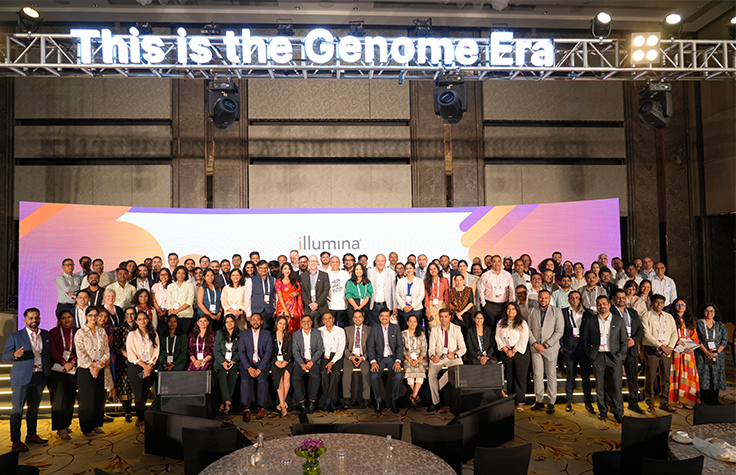
3 September 2024
At the Illumina India Genomics Summit on Friday 30 August 2024, Illumina announced the establishment of a Global Capability Center in Bengaluru, India, as an investment to expand its technology workforce in support of a global customer base.
India is on its way to becoming the world’s third largest economy by 2030 and it continues to confront public health issues such as tuberculosis, HIV/AIDS, malaria, and other infectious diseases. It is estimated that up to 96 million people in India have a rare disease1, and one in nine people in India are likely to develop cancer in their lifetime2. Expanding access to genomics in India will help unlock opportunities for advancing health care and combating the effects of climate change.
“Genomics is a critical part of public health, from characterizing new and emerging pathogens to revolutionizing the diagnosis, treatment, and prevention of disease,” said Gretchen Weightman, Illumina’s senior vice president of the Asia-Pacific, Middle East & Africa region. “Illumina has been supporting India for over a decade by providing access to genomic sequencing technologies, in particular next-generation sequencing, and building our presence and capability in India makes sense to accelerate this.”
Bengaluru joins Singapore; Cambridge, England; Eindhoven, the Netherlands; Shanghai; Madison, Wisconsin; Hayward, California; and San Diego as Illumina Global Capability Centers. As part of this, Illumina aims to employ more than 200 local software engineers, IT hardware and network engineers, system analysts, data engineers, data analysts, configuration analysts, data stewards, procurement buyers, supply chain planners, business process analysts, quality engineers, and other roles by the end of 2025.
Last year, Illumina opened a new office and state-of-the-art genomics lab – known as an Illumina Solutions Center in Bengaluru. The facility features a fully equipped laboratory with the latest next-generation sequencing technologies as provides training and education opportunities.
“Illumina has had a strong presence in India, working with our trusted channel partner Premas Life Sciences, for the past 17 years, and more recently with the opening of our ISC,” Weightman said. “During this time, we have seen the capability of the genomics industry in India grow substantially. Expanding Illumina’s presence in India offers us access to a talented workforce and helps Illumina take advantage of efficiencies, driving flexibility and agility to advance our mission further.”
The Illumina India Genomics Summit in Bengaluru, where the investment announcement was made, is Illumina India’s flagship event. It welcomed a variety of genomics experts, clinicians, researchers, and scientists to exchange their experience and knowledge around the latest updates in genomics, encompassing clinical and translational research.
In recent years, Illumina has also supported initiatives to increase access to sequencing capability in India. This includes technology for the Genome India Project and philanthropic funding with the Bill & Melinda Gates Foundation and the Rockefeller Foundation to support COVID-19 surveillance. In December 2023, Illumina launched the Global Health Access Initiative to better equip countries to perform pathogen sequencing locally. This program addresses key international logistics and supply chain challenges, strengthens health systems, enables better preparedness, and empowers countries to manage their own priority health threats.
Illumina’s other philanthropic support in India includes the company’s early COVIDSeq™ collaboration with the Council of Scientific and Industrial Research’s Institute of Genomics & Integrative Biology in New Delhi; its donation of US $1 million in sequencing capabilities to Mumbai’s Kasturba Hospital for COVID surveillance, and its use of whole-genome sequencing to detect drug resistance in tuberculosis at P. D. Hinduja Hospital.
References:
- Ministry of Health and Family Welfare, National Policy For Treatment Of Rare Diseases, 2017
- Indian J Med Res. 2022 Oct-Nov; 156(4-5): 598–607.